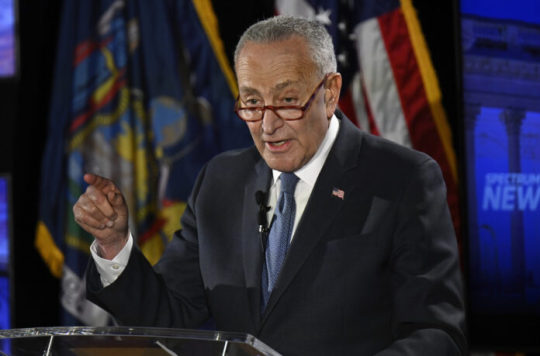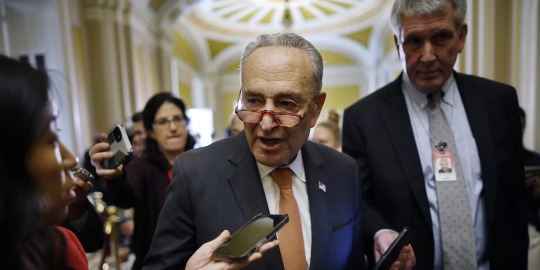#Senator Chuck Schumer
Text
It's easy to spot the sheep among the wolves
#Speaker Johnson (R-LA)#speaker mike johnson#Senator Schumer (D-NY)#Senator Chuck Schumer#White House#President Biden#Senate Majority Leader Schumer#Senate Minority Leader McConnell#House Minority Leader Jeffries#budget negotiations#FY2024#three days left#Ukraine#tick tock
2 notes
·
View notes
Text
Schumer Says to Grant Amnesty to Millions of Illegals to Replace Vanishing U.S. Population
Schumer Says to Grant Amnesty to Millions of Illegals to Replace Vanishing U.S. Population
WASHINGTON (Yaakov M / VINnews) — In a chilling video, Senator Chuck Schumer just admitted that he wants to give amnesty to 11 million illegals, because the US population is not “reproducing on its own. ”
In other words, Schumer is replacing the traditional American family with illegals (who will no doubt become Democrat voters).
It is not a stretch to believe that this has been the Democrat game…

View On WordPress
0 notes
Text
I feel like I need to look at a lot more analyses of the recent Chuck Schumer speech.
Senate Majority Leader Chuck Schumer on Thursday called on Israel to hold new elections, saying he believes Israeli Prime Minister Benjamin Netanyahu has “lost his way” and is an obstacle to peace in the region amid a growing humanitarian crisis in Gaza.
Schumer, the first Jewish majority leader in the Senate and the highest-ranking Jewish official in the U.S., strongly criticized Netanyahu in a 40-minute speech Thursday morning on the Senate floor. Schumer said the prime minister has put himself in a coalition of far-right extremists and “as a result, he has been too willing to tolerate the civilian toll in Gaza, which is pushing support for Israel worldwide to historic lows.”
“Israel cannot survive if it becomes a pariah,” Schumer said.
The high-level warning comes as an increasing number of Democrats have pushed back against Israel and as President Joe Biden has stepped up public pressure on Netanyahu’s government [...].
Schumer has so far positioned himself as a strong ally of the Israeli government [...].
There are... I want to say four? possible interpretations, generally:
A moral shift in response to circumstance: The situation in Gaza has escalated to such a point that he feels morally obligated to change his rhetoric, whether for Palestinians' sakes or Israeli's own sakes.
A moral shift in response to persuasion: Fellow Democrats and Independents have successfully begun to convince him that a change in rhetoric is needed.
A pragmatic shift in response to constituents: Voters from New York State have been blowing up his phones to argue him into putting conditions on aid to Israel, and he felt this was a good 'middle ground' to appeal to them without losing his pro-Israeli base.
A pragmatic shift in response to national trends: Continued protest votes like Michigan are starting to worry him and fellow 'traditional' Dems.
Or, most likely, some combination thereof.
Ethically, I hope it's one of the first two, and the Schumer has realized how ethically barren Israel's government currently is.
...in terms of 'can we actually affect things,' though? I hope this is a pragmatic shift. We cannot predict how individual Senators will change up their morals and philosophy, but if this change is in response to pressure from voters, then that means we can push them farther left.
Anyway.
Call your reps. Here's some suggestions on what to say.
EDIT: To clarify, I am not saying that Schumer is concerned about his own reelection. He is old and he isn't up for reelection until 2029, so it's even odds if he'll even run again. However, as the Senate Majority Leader, he is at least in theory required to take his party's opinions into account, and to worry about what is going to happen to the executive branch in November. Whether or not Schumer has any real power come 2025 is very heavily dependent on who the president is, and he is very aware of that.
He may also be worried about his actions causing backlash against Gillibrand (NY's junior senator).
#united states#israel#gaza#call your reps#palestine#death mention#politics#death tw#voting#chuck schumer#senator schumer#current events#phoenix politics
136 notes
·
View notes
Text
Ta-dah!!!!…

This just goes to show you Demonrats and Tessio Republicans (RINOs) really do exist

The uni-party cannot get this trash written in the lower House of Congress, so the Senate is going to do it themselves, and Joe Biden will sign it into law if it passes
This bill is not the will of We the People.
Schumer, Lankford and Biden are treasonous
Enjoy the final loss of our republic yo

Angie/Maddie🦇❥���︎🇺🇸
106 notes
·
View notes
Text
Joan McCarter at Daily Kos:
Senate Democrats are planning to make June Reproductive Rights Month, commemorating the anniversaries of Roe v. Wade in 1973 and Dobbs v. Jackson Womens’ Health that overturned it in 2022. With the Supreme Court ready to rule on access to both abortion pills and emergency abortions, they should have plenty of fodder.
But Donald Trump gave them even more with his gaffe Tuesday suggesting that he’s coming up with an “interesting” and “very comprehensive policy” on birth control. Never mind that he tried to walk it back—he put it out there, and Senate Majority Leader Chuck Schumer grabbed it up.
Schumer announced Wednesday that he is fast-tracking the Right to Contraception Act next month, so Republicans will be on record blocking it.
“Contraception is a critical piece of protecting women’s reproductive freedoms, standing as nothing short of a vital lifeline for millions of American women across the country,” Schumer said in a statement. “Senate Democrats are committed to restoring women’s freedoms and will fight to protect access to contraception and other reproductive freedoms that are essential safeguards for millions of women to control their own lives, futures, and bodies.”
[...]
Over the next month, Senate Democrats will hold votes and events to highlight just how out of touch the GOP is on all reproductive health issues—access to care, birth control, in vitro fertilization, and abortion.
That will likely include another vote on the bill from Sen. Tammy Duckworth of Illinois that would grant a federal right to IVF, in sharp contrast with GOP Sen. Ted Cruz’s effort to stake a weak claim on the issue.
Senate Democrats are planning to launch Reproductive Rights Month for the upcoming month of June to prepare for the 2nd anniversary of the Dobbs ruling that overturned Roe.
#US Senate#Roe v. Wade#Reproductive Rights Month#Reproductive Rights#Right To Contraception Act#Contraception#Birth Control#In Vitro Fertilization#Access To Family Building Act#Abortion#118th Congress#Tammy Duckworth#Chuck Schumer#Dobbs v. Jackson Women's Health Organization
7 notes
·
View notes
Text
What's actually in the Ukraine bill-a breakdown
Military Assistance
Military Personnel(no, this does not mean troops are being deployed) to respond to the situation in Ukraine and for related expenses: $238,190,000, subdivided into
Army: $207,158,000
Marine Corps:$3,538,000
Air Force: $23, 302,000
Space Force: $4,192,000
This is literally what it sounds like: paying for people to do things, as opposed to the next item...
Operations and Maintenance: $34,243,729,000, subdivided into
Army:$4,877,581,000
Navy:$976,405,000
Marine Corps$69(nice),045,000
Air Force: $371,475,000
Space Force:$8,443,000
Defense-wide(bolded for being important): $27,930,780,000. Of this, $13,772,460,000 is directly for aid to Ukraine, and $13, 414,432,000 is for replacement and reimbursement for both physical aid and service aid(ie training) given to Ukraine. In other words, only the first half is actually going to Ukraine(mostly in the form of physical things like vehicles, guns, ammo and equipment and not just money) while the second half never leaves America.
Procurement:$13,276,910,000, subdivided into
Missile Procurement, Army:$2,742,757,000
Ammunition Procurement, Army:$5,612,900,000,
Other Procurement, Army: $308,991,000
Weapons Procurement, Navy:$706,976,000
Other Procurement, Navy:$26,000,000
Marine Corps:$212,443,000,
Missile Procurement, Air Force:$366,001,000
Other Procurement, Air Force:$3,284,072,000
Defense-wide:$46,780,000,
Research Programs
Research and Development:$633,387,000, subdivided into
Army:$18,594,000
Navy:$13,825,000
Air Force:$406,834,000
Defense-wide:$194,125,000
Other Military Aid
Office of the Inspector General(this is funds for oversight): $8,00,000.
Related Agencies
Intelligence Community Management Account:$2,00,000
Energy Programs
Science for the production of medical, stable, and radioactive isotopes(no idea why this is here): $98,000,000
Atomic Energy Defense Activities
Defense Nuclear Nonproliferation for etc etc:$143,915,000
Federal Salaries and Expenses for etc etc: $5,540,000
Health and Human Services
Refugee and Entrant Assistance: $481,000,000. This provision specifically allows the relevant agencies to use this money for grants or contracts with nonprofits, which imo means it's likely that most of this will go towards aiding Ukrainian refugees in Europe, and thus that this isn't just money for moving Ukrainians to America.
Department of State
Diplomatic Programs to respond to the situation in Ukraine and countries affected by said situation: $60,000,000
United States Agency for International Development
USAID operating expenses appropriated to the President for response to etc etc: $39,000,000
USAID Office of Inspector General: $10,000,000
Bilateral Economic Assistance
Transition Initiatives(meaning transition to democracy): $25,000,000
Economic Support Fund(for Ukraine's government): $7,899,000,000. A provision states that none of this money may be used for pensions(as an anti-corruption measure) and that at least $50,000,000 of this amount must be used to respond to food insecurity caused by the war.
Assistance for Europe, Eurasia, and Central Asia(for Ukraine's private sector):$1,575,000,000
International Security Assistance
International Narcotics Control and Law Enforcement(for Ukraine and other countries affected by the invasion):$300,000,000
Nonproliferation, Antiterrorism, Demining and Related Programs(for Ukraine and other countries affected by the invasion): $100,000,000
Foreign Military Financing Program(for Ukraine and other countries affected by the invasion): $1,600,000,000
Some of the more impactful general provisions of the act:
The transfer of long-range ATACMS to Ukraine was required by the act, and that appears to have already happened. The President was given the option to not do so if he determined it would be detrimental to America's national security interests, but it appears he didn't.
The Secretary of State was directed to insure as much in-person monitoring as possible for funds appropriated for Economic Support, Assistance for Europe, Eurasia and Central Asia, International Narcotics Control and Law Enforcement, and Nonproliferation, Anti-terrorism, Demining and Related Programs
The amount of money spent out of the total amounts budgeted for Economic Support and Assistance for etc etc may not exceed half the total amount of funds given by all donors to Ukraine. This basically means that, in terms of economic assistance, Europe has to do at least as much spending as we do.
The two headings for economic assistance mentioned above(totaling to $9,474,000,000) are loans that the President may only forgive in the following circumstances: up to 50% of the debts incurred by these loans may be cancelled by the President at any time after November 15th, 2024, while the remaining 50% may be cancelled at any time after January 1st, 2026. Both cancellations would be subject to Congressional approval.
#ukraine#russia#ukraine war#russian invasion of ukraine#congress#house of representatives#senate#joe biden#biden#mike johnson#hakeem jeffries#chuck schumer#mitch mcconnell#ukraine aid
7 notes
·
View notes
Text
Why look like professionals? Many senators don't act like ones. The tragic thing about this is that they likely would have changed the dress code for Fetterman D-PA even if he hadn't have stroked out and been left impaired. People just do not care anymore and it shows.
#senate#chuck schumer#john fetterman#democrats#sign of the times#professionalism#your tax dollars at work#he's not my senator#pennsylvania#government#the people's business
22 notes
·
View notes
Text
Senate Republicans on Wednesday blocked efforts by Senate Democrats to pass an assault weapons ban and universal background checks legislation after the United States over the weekend broke the record for the most mass shootings in a single year.
Republican Sen. John Barrasso (R-Wyo.) objected to Senate Majority Leader Chuck Schumer’s (D-N.Y.) request for unanimous consent to pass the assault weapons ban, despite the pleas of Democratic senators who took to the Senate floor to cite the harrowing statistics of gun violence in America.
“The scourge of gun violence in America is a national crisis. The American people are sick and tired of enduring one mass shooting after another. They’re sick and tired of vigil and moments of silence for family, friends, classmates, coworkers,” Schumer argued on the Senate floor.
The assault weapons ban, originally sponsored by the late Sen. Dianne Feinstein (D-Calif.), would ban semiautomatic rifles with pistol grips, forward grips and folding or telescoping stocks, as well as rifles outfitted with grenade launchers, barrel shrouds or threaded barrels to allow for noise and flash suppressors to be attached.
But Barrasso argued that the Democratic-drafted bill would infringe on the Second Amendment and deprive law-abiding gun owners of an important liberty.
“Americans have a constitutional right to own a firearm. Every day, people across Wyoming responsibly use their Second Amendment rights to keep and bear arms,” he said. “Democrats are demanding that the American people give up their liberty.”
He said that Democrats are trying to ban many types of semiautomatic firearms “because of the way they look.”
He asserted that popular rifles such as AR-15s “work the same way as popular shotguns and other rifles used for hunting and personal protection.”
“The Second Amendment is freedom’s essential safeguard. Without it, there can be no liberty and there can be no security. So Mr. President, I object.”
Democratic Sen. Chris Murphy (Conn.) later stood up on the floor to ask for unanimous consent to pass legislation to require universal background checks for firearms purchases.
“We don’t have more mental illness in this country, we don’t spend less money on law enforcement, we don’t have angrier people, we have more guns, and we are much more permissive in this country about allowing felons, dangerous people, to get their hands on guns,” he said.
A Gallup poll conducted in June 2022 found that 92% of Americans favor requiring background checks for all firearm sales.
“This just feels like a test of democracy. It really does. Like, how does democracy survive if 90% of Americans, 90% of Republicans, 90% of Democrats want something, and we can’t deliver it?” Murphy asked before he asked for unanimous consent to pass the background checks bill.
Utah Republican Sen. Mike Lee took to the floor immediately to object.
“I want to note at the outset we’re not asked to vote in this chamber on polling questions. We vote on legislation,” he said.
He said the legislation to expand background checks “has some real problems with it.”
“This is not solely about transactions involving guns at gun stores. This is about the father who wishes to pass down a hunting rifle to his son or the friend who wants to lend a shotgun to his neighbor who is in need of protection at the time,” Lee said before objecting to Murphy’s request.
#us politics#news#the hill#us senate#senate republicans#assault weapons ban#gun violence#gun rights#mass shootings#gun regulation#gun reform#2023#Sen. John Barrasso#sen. Chuck Schumer#Sen. Dianne Feinstein#Sen. Chris Murphy#2nd amendment#Sen. Mike Lee
13 notes
·
View notes
Text
"Once passed, the House must swiftly take up the bill and send it to the president's desk to avoid a shutdown—giving Americans the help and resources they deserve," said Senate Majority Leader Chuck Schumer.
#chuck schumer#kevin mccarthy#mitch mcconnell#patty murray#u.s. senate#rosa delauro#house republicans#government shutdown
10 notes
·
View notes
Text
"Senate confirms 425 military nominees after Sen. Tommy Tuberville drops his hold. Tuberville "has nothing to show for his 10 months of delay" Senate Majority Leader Chuck Schumer said in a scathing speech after confirming the nominees. Tuberville has retained his hold on roughly 11 other promotions." Including 4 Star Generals.
During this one man crusade, 1 military leader had a heart attack, from holding multiple jobs. And put National Security at risk.
Thank You, Democrat Senate Majority Leader Chuck Schumer, for exposing Tuberville to Republican pressure, to stop his one man obstruction. Fuck this Anti-Choice Fascist.
2 notes
·
View notes
Text
Okay! Today brought some some more varied and nuanced analyses of the recent big Schumer speech, which I have previously posted about, and touched on the Trump response.
There are two that stood out with me:
One was really critical in a "this is not enough, it's just pretty words that functionally mean nothing" sense. This came from Democracy Now. Caveat: they focused way more on the UN resolution.
The other was, in my opinion, much more nuanced, and came from NYT's "The Daily" podcast, which featured an interview with Schumer himself. Caveat: the NYT has come under fire for being too biased towards Israel, though the podcast team is separate from the papers' team, and were previously responsible for getting a major story to undergo heavy revisions due to anti-Palestinian biases.
Going into this, I want to be clear that I am going to be viewing these through a lens of how much they may or may not help Palestine, and how much I think a given argument or form of rhetoric may have impacted the actions that Schumer and those around him have taken.
Democracy Now (March 22, 2024 episode)
Available in video/audio form, and as a transcript here. This section of the episode is titled "U.S. Said It Was Calling for a Gaza Ceasefire, But Its U.N. Resolution Didn’t Say That: Phyllis Bennis."
One of the things I just want to point out in the last moments, this issue of Chuck Schumer coming out against Netanyahu, there’s a move to isolate Prime Minister Netanyahu right now. And it’s certainly appropriate. Part of the reason he’s still in power is to stay out of jail. It’s a very personal crusade on his part. But we have to be very clear that the people who are likely to replace him, if he were to either resign or be recalled in an election, they all support this war. So we should not have the illusion, that I’m afraid people like Chuck Schumer and others might have, that anybody who’s not Netanyahu should be and would be welcomed with open arms in Washington with more weapons, more hundreds of smaller weapons shipments that wouldn’t necessarily have to be approved by Congress. This is a very dangerous reality. We have to be very clear that this is a systemic decision by the Israeli leadership. This is not a one-man show in this horrific genocidal war that is being waged in Gaza. And we have to be careful not to fall into that trap of putting it all on one person and thinking that if one person is replaced, somehow that’s an answer.
The Daily, from The New York Times
You can listen to it on Spotify or Youtube. Transcripts are not yet available for this one; the site says they're usually available by the next day. That said, I went through the YouTube auto-generated transcript because I thought some of it was important enough for that effort.
However, I think it's worth it to listen through to the whole thing if you've got the time. Things it touches on includes:
The relationship that Schumer and other older Jews have with the idea of Israel, as it developed during his childhood in the fifties and sixties, due to the very recent memory of the Holocaust.
Schumer's statement that he believes that Israel is seeding more problems for itself with the current conflict, due to how it is destabilizing the region and provoking escalations with Iran and its proxies, most notably Hezbollah in Lebanon.
The connection of Netanyahu's radicalization in general and his growing unpopularity with the American left with his friendship with Trump.
Schumer couches an incredible amount of his argument in what he believes will convince American Jews and people with conflicted feelings on Israel, and an insistence that he believes in what Israel stands for.
An implied threat of aid withdrawal from Israel if Netanyahu remains in power.
A recurring cynicism and criticism of Schumer by the podcast hosts. They explicitly ask "what is your red line" in regards to the number of dead civilians in Palestine.
This podcast included more of the actual speech, and the logic that underpins it, than any other coverage I've read or listened to yet.
Schumer is very careful to not threaten to withdraw aid, so it's only implied. He is very careful to not explicitly dictate who leads Israel.
What he does say is that, should Netanyahu remain in power...
The United States' bond with Israel is unbreakable, but if extremists continue to unduly influence Israeli policy, then the administration should use the tools at its disposal to make sure our support for Israel is aligned with our broader goal of achieving long-term peace and stability in the region.
and
BB, I agree with you, [that] the greatest short-term threat to Israel is the rockets Iran gives Hezbollah, and they put them in Lebanon, and shoot them at Israel, but the greatest middle and long-term danger is you lose America, particularly the half of America that's more Progressive and/or the half of America that's young, and by your embracing Trump, you are making that happen.
I agree with the hosts' interpretation that 'tools' refers to the US financial backing of Israel, particularly the military funding. Schumer denies a lot of the interpretations, but generally he denies it with 'that is not what I said,' rather than 'that is not what I meant.'
Italics indicate something was said during the interview; the podcast switches between the interview and commentary a few times.
Interviewer: You don't want a ceasefire, but, like, what is--there like 30,000 more Palestinians dead--
Schumer: Well I wouldn't, I-- I'd say look Isra--
Interviewer, commentary: I said, you know, what's your red line, what is the civilian death toll that would have to be reached for you to say 'we're pulling this funding.'
Interviewer: You said in your speech, if something doesn't change then there's the threat of American rich--
Schumer: I didn't--I didn't say conditions and I didn't say, um, leverage, I just said 'America's going to look at it as a thing that's' and--
Interviewer: You didn't say exactly what--
Schumer: No because I didn't want to
Interviewer: You didn't want to, but what would the scenario be where that would--
Schumer: Well, I--you'd have to see it, I don't, I couldn't speculate on the future.
Interviewer, commentary: ...and he didn't want to say.
Second host: Well then why even give the speech? If Schumer is not willing to talk about the real consequences for Israel if there are no elections, and if Israelis don't end up removing Netanyahu from office, if he can't explain that, why give this speech?
I think that overall, this podcast and the interview it contains is... encouraging. Much of what drove Schumer's rhetoric is something I spoke about a month ago, namely the ways that Israeli propaganda rests on real fears based in history, and the ways that convincing people who believe that propaganda is to stress how the current situation is increasing danger to Israel in the middle and long term.
It's a little gratifying, at least, to know that my own understanding of the political science of it all is relatively accurate, and that at least a few of the arguments I presented in my How To Call Your Reps post are things that have worked their way into higher levels of political discourse.
To support my blogging so I can move out of my parents' house, I do have a ko-fi. Alternately, you can donate to one of the charities I list in this post.
#chuck schumer#benjamin netanyahu#israel#united states#gaza#call your reps#palestine#death mention#politics#death tw#senator schumer#current events#phoenix politics#the daily#new york times#democracy now
20 notes
·
View notes
Link
Schumer would rather pass this bill after the midterms than embarass Republicans voting against it before the midterms.
12 notes
·
View notes
Link
* Have something you want to tell your Senators? If you can't safely contact them in person, here are some other options:
Call the Capitol Switchboard at (202) 224-3121 and ask to be connected to the representative of your choice.
Here is one that will send your reps a fax: https://resist.bot/
2 notes
·
View notes
Text

View on Twitter
$555 to Stay Alive: Your Action Needed- Billions on the Line for Ocean Climate Action! $555 billion (over 10 yrs) originally included in the #BBB needs to stay in play for #ClimateChange Contact your Senators + Senator Schumer & MAKE YOUR VOICE HEARD!
(Source)
#Climate Change#climate activism#call your senators#chuck schumer#ocean life#Climate Crisis#Late Stage Capitalism#My Tweets
1 note
·
View note
Text
Hundreds of Jewish anti-war demonstrators have been arrested during a Passover seder that doubled as a protest in New York, as they shut down a major thoroughfare to pray for a ceasefire and urge the Senate majority leader, Chuck Schumer, to end US military aid to Israel.
The 300 or so arrests took place on Tuesday night at Grand Army Plaza, on the doorstep of Schumer’s Brooklyn residence, where thousands of mostly Jewish New Yorkers gathered for the seder, a ritual that marked the second night of the holiday celebrated as a festival of freedom by Jews worldwide.
The seder came just before the US Senate resoundingly passed a military package that includes $26bn for Israel.
#JVP#protest#antiwar#GazaGenocide#Chuck Schumer#imperialism#Brooklyn#arrests#repression#NYPD#Israel#FreePalestine#seder#Passover
28K notes
·
View notes
Text
Chuck Schumer Privately Warns Pakistan : Don’t Kill Imran Khan In Prison
Supporters worry Khan’s life is in danger and with good reason: The military has a long history of killing deposed leaders.
— Ryan Grim, Murtaza Hussain | April 23 2024

Senate Majority Leader Chuck Schumer, D-N.Y., talks to reporters at the U.S. Capitol on Feb. 28, 2023. Photo: Chip Somodevilla/Getty Images
Senate Majority Leader Chuck Schumer Warned In A Conversation With Pakistan’s Ambassador To Washington that the safety of imprisoned former Prime Minister Imran Khan was a high priority of the United States, multiple sources familiar with the exchange told The Intercept.
The warning issued late last month by Schumer, the most powerful Democrat in Congress, to Pakistan came after intense activism by members of the Pakistani diaspora amid concerns that the Pakistani military may harm Khan, the former prime minister who was ousted from office in 2022.
“The Pakistani American diaspora has felt let down by Washington’s failure to engage power brokers in Pakistan and hold them accountable for blatant violations of human rights.”
“Chuck Schumer speaking to the ambassador regarding the safety of Imran Khan is very constructive,” Mohammad Munir Khan, a Pakistani American political activist in the U.S., told The Intercept. “The Pakistani American diaspora has felt let down by Washington’s failure to engage power brokers in Pakistan and hold them accountable for blatant violations of human rights, and destruction of basic fundamentals of democracy.”
Imran Khan is currently incarcerated on corruption charges that are widely seen as politically motivated. Khan, who is regarded as the most popular politician in Pakistan, was removed from power in an April 2022 no-confidence vote orchestrated by the country’s powerful military establishment and encouraged by the U.S. Since then, Khan’s party, Pakistan Tehreek-e-Insaf, or PTI, has faced a brutal repression that has raised international alarms and been denounced by human rights groups.
The concerns about Khan’s life that prompted Schumer’s call to the Pakistani Ambassador Masood Khan reflect a growing fear that the military may deal with Khan’s stubborn popularity by simply putting an end to his life behind bars. (Schumer’s office declined to comment for this story. The Pakistani Embassy in Washington did not immediately respond to a request for comment.)
The outreach from Schumer, who represents a large, vocal Pakistani American community in New York, came as a new governing coalition in the South Asian country seeks to consolidate power despite public disaffection over a February election rife with fraud.
In addition to banning PTI, Pakistan engaged in heavy repression ahead of the February vote. A record turnout suggested PTI-aligned candidates had the upper hand. Ignoring widespread fraud, however, a coalition of parties supported by the Pakistani military successfully formed a government led by Shehbaz Sharif in the vote’s aftermath.
The international community, including the U.S., noted voting irregularities, and credible allegations arose of vote rigging and flagrant fraud in the election.
“There is undeniable evidence, which the State Department agrees with, that there were problems with this election,” Rep. Greg Casar, D-Texas, told The Intercept in March. At the time, Casar and other members of Congress had just called on President Joe Biden to withhold recognition of the government, but Washington’s ambassador to Pakistan congratulated Sharif in early March.
“There is undeniable evidence, which the State Department agrees with, that there were problems with this election.”
Foreign policy experts in Washington said the Biden administration’s approach risked transgressing democratic principles in the name of security. Matt Duss, executive vice president of the Center for International Policy, said, “This appears to be an example where the administration is allowing its security relationship with a foreign government to crowd out other critical concerns like democratic backsliding and human rights.”
Imran Khan himself has reportedly been held in dire conditions at a prison in the Pakistani city of Rawalpindi. Last month, his visitor privileges were abruptly suspended for two weeks, prompting fears from his supporters about his physical conditions in custody. Earlier this month, one of his lawyers claimed that his personal physician was not being allowed to see him in jail. Khan’s wife, who is imprisoned on politically motivated charges of an un-Islamic marriage and graft, has also reportedly suffered health problems due to conditions of her confinement, according to remarks from her lawyer this week.
In a statement given to reporters from prison and later shared on social media, Khan, who was wounded in an attempted assassination in November 2022 at a political rally, alleged that there had been a plot to kill him while behind bars. Khan suggested his fate was in the hands of Gen. Asim Munir, Pakistan’s powerful army chief.
“Let it be known that if anything happens to me or my wife, it’ll be him who will be responsible,” Khan said.
Schumer’s call to the Pakistani ambassador, however, may play into the military’s calculations about killing Khan. “A senior Democrat influential in the Biden administration is sending a warning, which is somewhat significant,” said Adam Weinstein, the deputy director of the Middle East program at the Quincy Institute, adding that he did not believe the military would kill Khan in prison.
As extreme as a step it would be, the military harming or even killing a leader it ousted, even one as popular as Khan, would fit a pattern in Pakistani history. Several Pakistani leaders have died violently in the past few decades after falling out with the military, some under murky circumstances, while others, like former Prime Minister Zulfikar Ali Bhutto, were executed by military rulers after being deposed from power.
Although nominally led by a civilian government today, Pakistan’s military is widely known to call the shots in the country politically and is currently led by Munir, whose clashes with Khan and his party have been the main political storyline in the country for over a year.
For Pakistani activists in the U.S., the American relationship with Pakistan creates leverage that can be used to ensure that Khan is not murdered behind bars. Mohammad Munir Khan, the Pakistani American activist, said, “The least Washington can do is to ensure Imran Khan is not harmed physically.”

Supporters of Pakistan’s former Prime Minister Imran Khan and his Pakistan Tehreek-e-Insaf, or PTI, party hold a March 10, 2024, protest in Peshawar against election fraud. Photo: Abdul Majeed/AFP via Getty Images
Capitol Hill Hearing
The U.S. has played an outsized role in Pakistan’s internal politics, especially over the past several years, including a pivotal role in Khan’s ouster from power.
In August 2023, The Intercept reported on and published a classified Pakistani diplomatic cable — a contentious document that had become a centerpiece of political drama, though its contents had remained unknown — showing that Khan’s removal from power had taken place following intense pressure placed on the Pakistani government by U.S. State Department officials.
In the cable, Assistant Secretary of State Donald Lu, whose office covers South Asia at the State Department, is quoted as telling the Pakistani ambassador to Washington that the countries’ relations would be seriously damaged if Khan were to remain in power.
“I think if the no-confidence vote against the Prime Minister succeeds, all will be forgiven in Washington,” Lu said, according to the Pakistani cable.
Since Khan’s removal from power, the U.S. has worked closely with the new military-backed Pakistani regime. Pakistan provided weapons to Ukraine in exchange for the U.S. brokering a favorable International Monetary Fund loan package, according to previous reporting from The Intercept.
Before being imprisoned, Khan made frequent reference to the classified cypher and even claimed to be brandishing a physical copy during a political rally. He is now facing a lengthy prison sentence on charges related to his handling of classified information, in addition to the raft of corruption charges that initially landed him in custody.
Coming in the context of a broader crackdown on his party — which has including killings, extrajudicial disappearances, and torture targeting supporters of PTI and members of the press — most observers believe Khan’s continued imprisonment is a politically motivated gambit to keep him and his movement out of power.
Following this year’s election, with Casar and others in Congress raising questions about Khan’s removal and the vote, the U.S. House Foreign Affairs Committee held a hearing featuring Lu, the assistant secretary of state.
The sole person testifying, Lu denied that he had been involved in a “regime change” in Pakistan — a reference to Khan’s comments about his role and the content of the cable reported by The Intercept.
On the election, Lu paid lip service to concerns about how the ballot was carried off, while failing to outline what consequences there would be for the vote rigging.
“You have seen actions by our ambassador and our embassy,” Lu said, alluding the congratulations extended by the U.S. to Pakistan’s new prime minister. He then quickly added: “We are in every interaction with this government stressing the importance of accountability for election irregularities.”
“In the long term it has never worked out in the United States’ benefit to be seen as propping up illegitimate, military-led governments.”
Rep. Brad Sherman, D-Calif., raised the issue of Khan’s safety in detention at the hearing. Sherman urged Lu to meet directly with Khan in prison, earning applause from the mostly Pakistani audience in hand.
“Ensuring the safety of leaders, regardless of political differences, is paramount,” said Atif Khan, another Pakistan American diaspora activist. “Congressman Brad Sherman rightly advocated for accountability and protection, urging the US Ambassador to visit former Prime Minister Imran Khan and prioritize his well-being.”
While Khan’s fate hangs in the balance, members of Congress have warned that continued U.S. support for a government seen as illegitimate by most Pakistanis risks harming not just Pakistan, but also the U.S. position in a critical region.
“Promoting democracy is important in itself, but it’s in our interests as well,” Casar, the Texas Democrat, told The Intercept. “Regardless of the short-term military benefits, in the long term it has never worked out in the United States’ benefit to be seen as propping up illegitimate, military-led governments.”
#The Intercept#Pakistan 🇵🇰#Imran Khan#Senate Majority Leader | Chuck Schumer#Chuck Schumer’s Warning#Deposed Leaders
0 notes